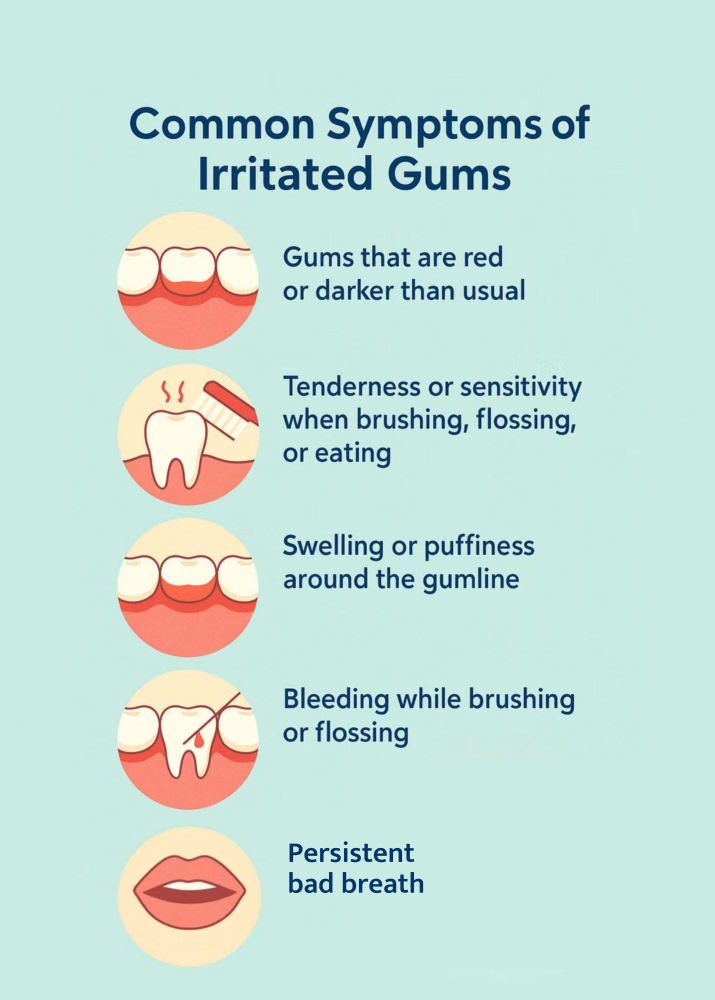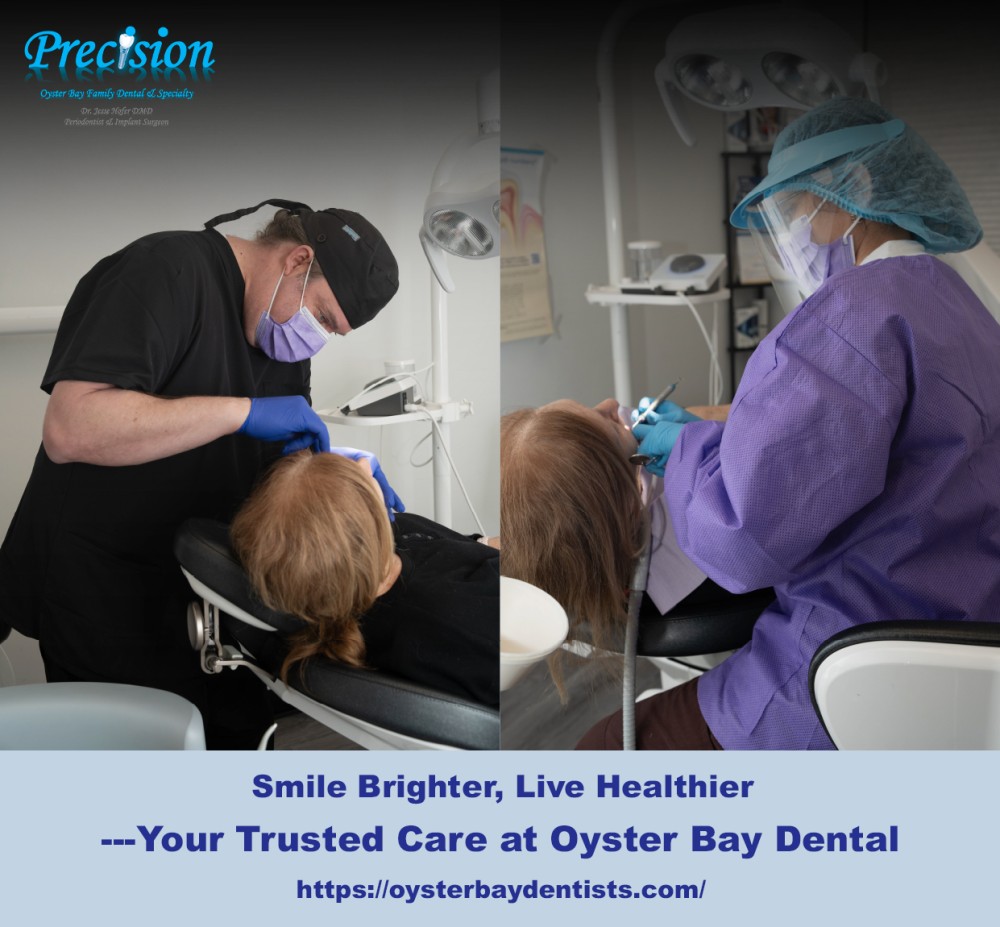Gum Irritation: Causes, Symptoms, and Relief Tips
Written by Dr. Jesse Hofer, DMD April 17, 2025 18:49
Whether it’s a sign of early gum disease, a reaction to your toothbrush, or something else entirely, irritated gums are your mouth’s way of saying, “Hey, I need a little attention over here.” The good news? There’s a lot you can do to get things back on track—and we’re here to walk you through it.
We’ve helped so many neighbors here in Oyster Bay—from longtime patients to first-timers—find relief and peace of mind when it comes to their gum health. And we’d love to do the same for you.
🦷 If you’re dealing with gum irritation and want real answers (and real solutions), call us at 516-922-5730 or take a peek at our periodontal services—we’d be honored to help.
🔑 Key Takeaways
- Gum irritation can come from brushing too hard, skipped flossing, diet, or even stress—and sometimes it points to a bigger issue like gum disease.
- Common symptoms include soreness, redness, bleeding, and puffiness (aka that “my gums feel angry” feeling).
- Home remedies like saltwater rinses and using a soft-bristled brush can help in the short term—but they’re not a replacement for professional care if symptoms stick around.
- Regular checkups, gentle hygiene habits, and catching early signs can help keep irritation from turning into something more serious.
- If your gums are feeling off for more than a week or two, it’s worth getting them checked. That little twinge could be your early warning sign—and we’d rather catch it early than treat it late.
What Causes Gum Irritation—And How to Identify It
Sometimes it’s about technique, sometimes it’s about what you're eating, and other times it's your body's way of waving a little red flag that something deeper is going on.
The tricky part? Irritated gums don’t always look alarming at first. They might just feel a bit tender or swollen, or bleed a little when you floss. But these are important signs that shouldn’t be ignored.
Common Symptoms of Irritated Gums

Here’s what to look out for:
- Gums that are red or darker than usual
- Tenderness or sensitivity when brushing, flossing, or eating
- Swelling or puffiness around the gumline
- Bleeding while brushing or flossing
- Persistent bad breath (yep—your gums could be to blame)
If any of these sound familiar, don’t worry—you’re not alone. We see this all the time, and the earlier you catch it, the easier it is to fix.
Top Causes of Gum Irritation: From Food to Health Conditions
There are quite a few reasons why your gums might be irritated. Some are simple, everyday things, and others are signs of underlying issues:
- Overbrushing or using a hard-bristled toothbrush (your gums want gentle, not aggressive!)
- Skipping flossing, or flossing too roughly
- Sugary or acidic foods and drinks, like soda, candy, and even citrus
- Tobacco use, which irritates the gums and slows healing
- Hormonal changes (hello, pregnancy or menopause)
- Medical conditions like diabetes, or even certain medications
- And of course, gum disease—which often starts as minor irritation
Whatever the cause, if your gums are irritated consistently, it’s a sign that something’s off—and your mouth is asking for help.
How Poor Oral Hygiene Contributes to Gum Irritation
Let’s be real for a second: life gets busy. Sometimes brushing happens quickly before work, and flossing...well, gets skipped now and then. We’ve all been there.
But when plaque and food particles stick around, bacteria love to set up camp. This can lead to inflammation, swelling, and the early stages of gingivitis—the most common cause of gums irritation we see in our office.
The good news? This is all reversible with good hygiene habits and a little help from your dental team.
Preventing Gum Irritation
The best way to deal with gum irritation? Don’t let it happen in the first place. Prevention doesn’t have to be complicated, and it makes a huge difference for long-term gum and tooth health.
Home Remedies for Relieving Gum Irritation
If your gums are already irritated, here are some things you can try at home before you make your way to the dentist’s chair:
- Warm saltwater rinses – A simple mix of warm water and salt can reduce inflammation and soothe sore tissue.
- Cold compress – Applying an ice pack to your cheek can help ease gum swelling.
- Chamomile tea bags – Mildly anti-inflammatory and surprisingly soothing.
- Switch to a soft-bristled toothbrush – Your gums will thank you.
- Use alcohol-free mouthwash – It’s gentler and helps reduce bacteria.
These remedies can offer temporary relief—but they’re not a substitute for professional care if the irritation lingers.
Tips for Healthy Gums
Here’s what we recommend to all our patients in Oyster Bay—young, old, and everyone in between:
- Brush twice a day (gently!) using fluoride toothpaste
- Floss daily—yes, it matters more than you think
- Visit your dentist regularly (we promise we’re friendly)
- Eat a balanced diet rich in vitamins C and D
- Hydrate to keep your mouth naturally clean
- Know your body—hormones, stress, and health issues can affect your gums, too
A little consistency goes a long way in preventing future flare-ups.
When to See a Dentist About Irritated Gums

Let’s talk about that moment when you realize: “Okay, this isn’t going away on its own.” That’s the right time to give us a call.
We recommend booking a visit if:
- Your gum irritation lasts more than a week
- You’re experiencing persistent bleeding or swelling
- You’ve noticed a receding gumline
- Your teeth feel loose or your bite has shifted
- You suspect gum disease or an infection
At Precision Oyster Bay, we’re not here to lecture—we’re here to listen. We’ll take the time to understand what’s going on and build a plan that works for you. Whether you’re a longtime local or new to the area, we’re here to help you feel confident and comfortable in your smile again.
Get in Touch to Keep Your Gums Happy & Healthy
Your gums are the foundation of your smile—don’t let discomfort go unchecked. If you’ve been dealing with tender, swollen, or bleeding gums, let’s figure it out together. Early care can prevent much bigger issues down the line.
📞 Call us at 516-922-5730 or shoot us a message to schedule a visit today. We’ll take great care of you, every step of the way.
FAQs
What’s the most common cause of gum irritation?
In our experience, it’s usually plaque buildup from inconsistent brushing and flossing. But it can also be due to food particles stuck under the gumline, stress, or even changes in your body like hormone shifts or illness.
Can irritated gums heal on their own?
Sometimes—especially if it’s caused by something minor like brushing too hard or eating a particularly crunchy snack. But if it lasts more than a few days or comes with swelling, bleeding, or pain, it’s time to get checked.
Is gum irritation a sign of gum disease?
It can be. Mild gum irritation is often the first stage of gum disease, known as gingivitis. It’s very treatable if caught early, but left alone, it can lead to more serious issues like periodontitis. You can read more about gum disease here.
Should I avoid flossing if my gums are irritated?
It depends on the cause. If your gums are bleeding because of buildup, gently continuing to floss can actually help them heal. But if flossing causes sharp pain or worsens the irritation, it’s best to check in with a dentist first.
References
- “Gingivitis”, mayoclinic.org, Nov. 16, 2023,https://www.mayoclinic.org/diseases-conditions/gingivitis/symptoms-causes/syc-20354453
- Hilary Parker, “Gum Problem Basics: Sore, Swollen, and Bleeding Gum”, webmd.com, October 14, 2024, https://www.webmd.com/oral-health/gum-problem-basics-sore-swollen-and-bleeding-gums
- “Swollen Gums”, my.clevelandclinic.org, April 17, 2023,https://my.clevelandclinic.org/health/diseases/24907-swollen-gums